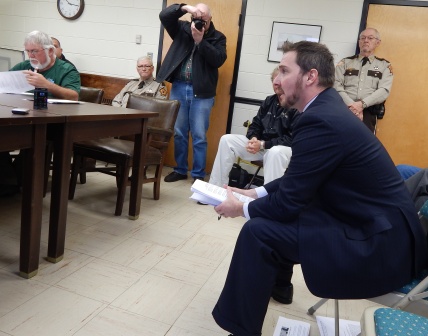‹
›

Fulton Fiscal Court meets to pass RtW ordinance.

AFL-CIO attorney David Suetholz addresses Fulton Fiscal Court.

Bluegrass Institute Director Jim Waters addresses Fulton Fiscal Court.

Fulton County Judge David Gallagher and Jim Waters.

Fulton County Attorney Rick Majors reads draft ordinance.

L to R: Jim Waters, County Clerk Betty Abernathy, Econ. Dir. Eddie Crittendon, Fulton County Judge elect Jim Martin, Magistrate Bill "Bubba" Nelms.
(Hickman, KY - December 30, 2014) - In less time than it took to walk into the meeting, all Fulton County Fiscal Court members present voted unanimously to pass right to work ordinance. In passing the ordinance, Fulton County Fiscal Court followed the lead of Warren County. Other counties have either passed a similar ordinance or are considering passing one.
After a first reading on December 12th, a second reading for passage was scheduled for December 29th. That effort stalled when Fulton County Attorney Rick Major pointed out that a typo changed the meaning of the ordinance. At that meeting, attorney David Suetholz, representing the AFL-CIO, urged the ordinance be delayed, arguing that legal challenges were sure to follow. Retired and active union workers also showed up at the December 29 meeting to argue against passage. Their efforts were unsuccessful.
Suetholz told the Court that legal action would be taken. That brought an angry response from County Judge David Gallagher. "Is that a threat?" he asked.
Sueholtz assured him it was not a threat, but a statement of fact.
Bluegrass Institute Director Jim Waters also attended the meeting. His organization strongly supports right to work legislation. Waters told the Fiscal Court that the Kentucky Association of Counties (KACO) was poised to assist counties that pass right to work ordinances. That information, while heartening to local officials, has not been confirmed at this writing.
Waters cited statistics supporting right to work legislation as job incentives. Waters and Gallagher both stated that right to work legislation is not anti-union.
Creation of jobs appeared to be the impetus for passage. More than once, Gallagher expressed his belief that companies that might locate in Fulton County wrote off the county because it is not right to work.
"It's about jobs." He said. "We must get jobs in here."
Fulton County has suffered from 20% unemployment over the past few years. See "Unhappy News for Fulton County" WKJ July 2013
The County recently moved out of the top ten unemployed with a rate of 8%. Fulton Countians lost jobs at the Goodyear Tire plant in Union City, a union plant that closed in 2011. The company laid off over 1800 workers. Union City is in Obion County. That county in Tennessee and Fulton County in Kentucky share a border. One Fulton county town, Fulton lies side by side with Tennessee's South Fulton.
Fulton County, according to Gallagher, competes not with Kentucky, but with Tennessee a right to work state. If Tennessee is a right to work state, Gallagher believes that Fulton County operates under a disadvantage.
Pointing to the closure of Goodyear, Gallagher told union members that Goodyear was a union company. "What good did that do you?" he said.
Fulton -Hickman County Economic Development Director Eddie Crittendon backed up Gallagher's assertions, saying that experts consulted listed the lack of right to work laws as a major factor in passing Fulton County by.
The Fulton Fiscal Court adjourned upon the advice of the County Attorney. The Court was determined to pass the ordinance before new Fulton County Judge Jim Martin takes over. A little over 24 hours later, the Court reconvened without Majors present and quickly passed the Ordinance. Only local supporters of the ordinance and the press were present. Following the vote, applause broke out in the audience.
Fulton County Ordinance 2014 - 06 grants workers "freedom to choose employment without restraint or coercion regarding the payment of mandatory dues, fees or other payments to a labor organization as a condition of employment." The ordinance does not bar unions in Fulton County. It bars organizing activities that may be perceived as threatening or coercive.
The Sheriff of Fulton County now has a duty to investigate and prosecute activities reported as criminal under the Ordinance. Conviction can carry up to one year in jail as a Class A Misdemeanor.
Violators of the Ordinance are also subject to civil liability in circuit court. Any individual "harmed as a result of any violation or threatened violation" shall recover actual damages and attorney fees and costs.
Opponents of the patchwork of ordinances point to a 1965 case coming out of Shelbyville that found governmental subdivisions cannot pass local ordinances. Only the state can pass right to work ordinances, according to AFL-CIO vs. Puckett. The 49 year old case is the last word on the issue.
Attorney General Jack Conway issued an opinion agreeing with the Puckett decision. Although Puckett addressed a city's ability to pass right to work legislation, the opinion said that Congress made an exception for the states in labor management law, not for the myriad subdivisions.
Legal challenges are expected to be filed.
|












